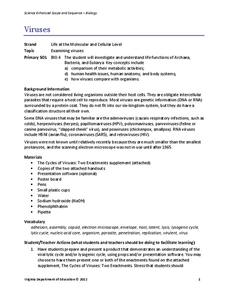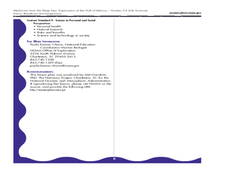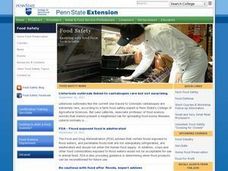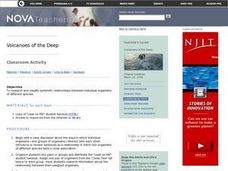Virginia Department of Education
Viruses
Germs, parasites, and viruses, oh my! Facilitate a instructional activity on viruses as individuals explore functions of Archaea, Bacteria, and Eukarya. They learn how viruses compare with other organisms in nature and how they...
Curated OER
Nitrogen Fixation, OR What a Gas!
Students gain skill in the design, implementation, and reporting of a scientific research project using the scientific method. They set up an experiment to determine the effect of adding the Rhizobium bacteria to one group of legume...
Curated OER
Microfriends: Medicines from the Deep Sea
Students explore the concept of beneficial microorganisms. In this microorganisms lesson, students observe different bacteria found in organisms Students discuss and describe three ways that microorganisms benefit humans.
NOAA
Microfriends
Is there medicine found in the organisms that live deep below the surface of the ocean? The fifth lesson in a six-part series has learners team up to research bacteria and the relationship it has with nearly every living thing on Earth....
Curated OER
Nitrogen Fixation, OR What a Gas!
Students illustrate the adaptation and co-evolution of organisms. They examine set up an experiment to determine the effect of adding the Rhizobium bacteria to a group of legume seeds.
Curated OER
Ah Choo!
Students compare bacteria to viruses to find the differences. In this biology lesson, students research viruses they have been inoculated against, using the Internet. Students complete a graphic organizer of their research on common...
Curated OER
Parasites: Our Tiny Companions
Young scholars consider parasites that seek human hosts. They prepare nutrient agar plates and cultivate samples of bacteria taken from their own bodies. They experiment with disinfectants and soaps to determine which method kills the...
Centers for Disease Control and Prevention
Teach Mrs. Jones' Class about Microbes
During a biology lesson, scholars research microbes, design a lesson plan using an outline, and present the lesson to the class.
Curated OER
Smallest Thing
Students compare characteristics of myobacteria and viruses to determine which is the smallest life form. They read and discuss an article that presents different viewpoints on the definition of life to determine their own viewpoint.
Serendip
The Ecology of Lyme Disease
Areas that previously included no risk of Lyme disease now have cases every year. Scholars learn about the spread of Lyme disease and the relationship with ecological succession. Then, they discuss possible solutions using the known food...
Children’s Hospital of Philadelphia
Understanding How Diseases Spread
To boost disease prevention, high schoolers arm themselves with information about infectious diseases and how they spread. Scholars research the causes, prevention techniques, and identify high-risk groups especially vulnerable to a...
Curated OER
How Clean Is Our Water?
Students examine samples of water to determine its cleanliness. They visit a waste treatment plant and/or reservoir. Students explore what protects the water supply from contamination by chemical or organize pollution. They trace the...
Curated OER
Water Quality and Temperature
Students are led through three activities to explore the effect of temperature fluctuations on the growth and survival of aquatic plants, clams, and shrimp eggs.
Curated OER
Household Pests
Students participate in an experiment to show how germs are spread, by food, fingers and feces. They conduct a bacteria count using a colony counter.
Curated OER
Hands of Doom
Students discuss the four essential step used for safe food handling: clean, separate, cook, and chill. They identify the bacteria that can cause food poisoning, practice how to properly wash hands before and after handling food,...
Curated OER
What happens to water before we use it?
Learners examine how water is treated prior to becoming available for human consumption. In this water treatment lesson plan, students conduct an experiment in which they filter water. Learners formulate a hypothesis, test, analyze data,...
Centers for Disease Control and Prevention
Understanding the Epidemiologic Triangle through Infectious Disease
Introduce infectious diseases and the epidemiologic triangle. A helpful resource describes the agent, host, and environment from the three vertices as well as the time factor, which is in the middle. Scholars complete a simple...
Curated OER
Farm * Examination 2
In this assessment, 10th graders Match the vocabulary terms in column A with the definitions in column B. Write the letter of the definition in column B in the space next to the terms in column A. Upon completionof the first task,...
Curated OER
Skin: The Behavior and Health Connection
Young scholars explore how personal behavior can affect health, especially the health of your skin. They become better aware of how their personal behavior and the environment can have a considerable impact on their health in general....
Curated OER
What Can I Do?
Students discuss feelings and ways to deal with problems. In this conflict resolution lesson, students identify their feelings and learn ways to resolve conflicts with others.
Curated OER
What Is the Nature of Science?
Students distinguish between scientific and everyday meanings of key words-theory, hypothesis, law, fact-and use in context. They recognize the variables that affect observation, data collection, and interpretation. They discover the...
Curated OER
Epidemic, Plague, and Infection
Students recognize disease vectors (pathways) and risk factors for infectious diseases.
Curated OER
Microbes and Our Food
Young scholars investigate foodborne illnesses and involved microbes. They identify major pathogens and then research and explain how they contaminate foods and how people are affected.
Curated OER
Volcanoes of the Deep
Students discuss how organisms relate to one another. They work together to research a specific organism and how it relates to other organisms. They present their findings to the class.

























